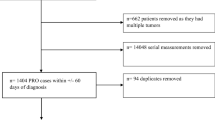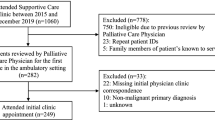Abstract
Purpose
Patient-reported outcome measures (PROMs) are useful clinical tools to recognise symptoms, patient needs and their severity. Whilst PROMs are routinely utilised in integrative oncology (IO) and supportive care (SC) services to improve patient care, they are not as common in general oncology. We explored our patients’ symptom burden, the approach taken by clinicians to identify and manage patient needs, and barriers and facilitators to using PROMs in an Australian tertiary comprehensive cancer centre to inform wider implementation of PROMs.
Methods
From 2017 to 2018, PROM data collected for patients accessing IO and SC was retrospectively analysed. Semi-structured interviews with oncology doctors and nurses explored their approach to patient needs assessment and their use of PROMs.
Results
A total of 404 patients completed the Edmonton Symptom Assessment Scale (ESAS). The most frequently identified symptoms were sleep disturbance, fatigue and lack of wellbeing. Symptom clusters included drowsiness, fatigue and shortness of breath; anxiety and depression; sleep and pain; appetite and nausea. In total, 9 nurse consultants, 5 surgeons, 7 medical and 5 radiation oncologists were interviewed. Most participants took an intuitive approach to identifying and managing patient needs and did not routinely use PROMs. Perceived risks, barriers and facilitators to using PROMS are presented.
Conclusions
High and complex symptom burden was found in our IO and SC patient population, reinforcing the need for screening. Whilst wider clinical use of PROMs within the hospital may improve clinical outcomes, the barriers and facilitators identified by Health Care Professionals (HCPs) need to be addressed before implementing PROMs more broadly.
Similar content being viewed by others
Data Availability
The authors declare that data and material supporting the findings of this study are available within the article and its supplementary information files.
Code availability
Not applicable
References
Bonevski B, Sanson-Fisher R, Girgis A, Burton L, Cook P, Boyes A, the Supportive Care Review Group (2000) Evaluation of an instrument to assess the needs of patients with cancer. Cancer 88(1):217–225
Carey M, Lambert S, Smits R, Paul C, Sanson-Fisher R, Clinton-McHarg T (2012) The unfulfilled promise: a systematic review of interventions to reduce the unmet supportive care needs of cancer patients. Support Care Cancer 20(2):207–219
Sanson-Fisher R, Girgis A, Boyes A, Bonevski B, Burton L, Cook P, Supportive Care Review Group (2000) The unmet supportive care needs of patients with cancer. Cancer 88(1):226–237
Boyes A, Girgis A, Lecathelinais C (2009) Brief assessment of adult cancer patients’ perceived needs: development and validation of the 34-item Supportive Care Needs Survey (SCNS-SF34). J Eval Clin Pract 15(4):602–606
McElduff P et al (2004) Supportive Care Needs Survey: A guide to administration, scoring and analysis. Newcastle, Centre for Health Research & Psycho-oncology
Howell D, Molloy S, Wilkinson K, Green E, Orchard K, Wang K, Liberty J (2015) Patient-reported outcomes in routine cancer clinical practice: a scoping review of use, impact on health outcomes, and implementation factors. Ann Oncol 26(9):1846–1858
Lopez G, Lacey J, Christie AJ, Powers-James C, Narayanan S, Liu W, Cohen L (2019) Patient-reported outcomes in integrative oncology: bridging clinical care with research. Cancer J 25(5):311–315
Fan G, Filipczak L, Chow E (2007) Symptom clusters in cancer patients: a review of the literature. Curr Oncol 14(5):173–179
Basch E, Deal AM, Dueck AC, Scher HI, Kris MG, Hudis C, Schrag D (2017) Overall survival results of a trial assessing patient-reported outcomes for symptom monitoring during routine cancer treatment. Jama 318(2):197–198
Basch E, Deal AM, Kris MG, Scher HI, Hudis CA, Sabbatini P, Rogak L, Bennett AV, Dueck AC, Atkinson TM, Chou JF, Dulko D, Sit L, Barz A, Novotny P, Fruscione M, Sloan JA, Schrag D (2016) Symptom Monitoring With Patient-Reported Outcomes During Routine Cancer Treatment: A Randomized Controlled Trial. J Clin Oncol 34(6):557–565
Wit CM, Balneaves LG, Cardoso MJ, Cohen L, Greenlee H, Johnstone P, Kücük Ö, Mailman J, Mao JJ (2017) A comprehensive definition for integrative oncology. JNCI Monogr 2017(52). https://doi.org/10.1093/jncimonographs/lgx012
MASCC (2020) Strategic Plan - Definition of Supportive Care. [cited 2020 27/02/2020]; Available from: https://www.mascc.org/index.php?option=com_content&view=article&id=493:mascc-strategic-plan&catid=30:navigation
SIO (2017) Definition of Integrative Oncology. [cited 2020 27/02/2020]; Available from: https://integrativeonc.org/
Ben-Arye E, Schiff E, Zollman C (2013) Integrating complementary medicine in sup- portive cancer care models across four continents. Med Oncol 30(2):511
Lim E, Vardy JL, Oh B, Dhillon HM (2017) Integration of complementary and alternative medicine into cancer-specific supportive care programs in Australia: A scoping study. Asia Pac J Clin Oncol 13(1):6–12
Smith C et al (2017) Integrative oncology in Australia 2016: mapping service provision and exploring unmet needs
Berman R, Davies A, Cooksley T, Gralla R, Carter L, Darlington E, Scotté F, Higham C (2020) Supportive care: an indispensable component of modern oncology. Clin Oncol 32(11):781–788
Lopez G, McQuade J, Cohen L, Williams JT, Spelman AR, Fellman B, Li Y, Bruera E, Lee RT (2017) Integrative Oncology Physician Consultations at a Comprehensive Cancer Center: Analysis of Demographic, Clinical and Patient Reported Outcomes. J Cancer 8(3):395–402
Polley MJ, Seers HE, Cooke HJ, Hoffman C, Paterson C (2007) How to summarise and report written qualitative data from patients: a method for use in cancer support care. Support Care Cancer 15(8):963–971
Frenkel M, Cohen L, Peterson N, Palmer JL, Swint K, Bruera E (2010) Integrative medicine consultation service in a comprehensive cancer center: findings and outcomes. Integr Cancer Ther 9(3):276–283
Ben-Arye E, Aharonson ML, Schiff E, Samuels N (2015) Alleviating gastro-intestinal symptoms and concerns by integrating patient-tailored complementary medicine in supportive cancer care. Clin Nutr 34(6):1215–1223
Grant SJ, Marthick M, Lacey J (2019) Establishing an integrative oncology service in the Australian healthcare setting-the Chris O’Brien Lifehouse Hospital experience. Support Care Cancer 27(6):2069–2076
Lacey J, Lomax AJ, McNeil C, Marthick M, Levy D, Kao S, Nielsen T, Dhillon HM (2019) A supportive care intervention for people with metastatic melanoma being treated with immunotherapy: a pilot study assessing feasibility, perceived benefit, and acceptability. Support Care Cancer 27(4):1497–1507
Grant SJ et al (2019) Integrative oncology: international perspectives. Integr Cancer Ther 18:1534735418823266
Nguyen H, Butow P, Dhillon H, Morris L, Brown A, West K, Sundaresan P (2020) Using patient-reported outcomes (PROs) and patient-reported outcome measures (PROMs) in routine head and neck cancer care: What do health professionals perceive as barriers and facilitators? J Med Imaging Radiat Oncol 64:704–710
Bruera E, Kuehn N, Miller MJ, Selmser P, Macmillan K (1991) The Edmonton Symptom Assessment System (ESAS): a simple method for the assessment of palliative care patients. J Palliat Care 7(2):6–9
Richardson LA, Jones GW (2009) A review of the reliability and validity of the Edmonton Symptom Assessment System. Curr Oncol 16(1):55
Ganesh V, Zhang L, Chan S, Wan BA, Drost L, Tsao M, Danjoux C, Barnes E, McDonald R, Rowbottom L, Zaki P, Chow R, Hwang MK, DeAngelis C, Lao N, Chow E (2017) An update in symptom clusters using the Edmonton Symptom Assessment System in a palliative radiotherapy clinic. Support Care Cancer 25(11):3321–3327
Deng GE, Frenkel M, Cohen L, Cassileth BR, Abrams DI, Capodice JL et al (2009) Evidence-based clinical practice guidelines for integrative oncology: complementary therapies and botanicals. J Soc Integr Oncol 7(3):85
Miaskowski C, Barsevick A, Berger A, Casagrande R, Grady PA, Jacobsen P et al (2017) Advancing symptom science through symptom cluster research: expert panel proceedings and recommendations. J Natl Cancer Inst 109(4). https://doi.org/10.1093/jnci/djw253
Geerligs L, Rankin NM, Shepherd HL, Butow P (2018) Hospital-based interventions: a systematic review of staff-reported barriers and facilitators to implementation processes. Implement Sci 13(1):36
Xiao C, Polomano R, Bruner DW (2013) Comparison between patient-reported and clinician-observed symptoms in oncology. Cancer Nurs 36(6):E1–E16
Kotronoulas G, Kearney N, Maguire R, Harrow A, di Domenico D, Croy S, MacGillivray S (2014) What is the value of the routine use of patient-reported outcome measures toward improvement of patient outcomes, processes of care, and health service outcomes in cancer care? A systematic review of controlled trials. J Clin Oncol 32(14):1480–1501
Kitson AL, Rycroft-Malone J, Harvey G, McCormack B, Seers K, Titchen A (2008) Evaluating the successful implementation of evidence into practice using the PARiHS framework: theoretical and practical challenges. Implement Sci 3:1
Funding
Dr Diana Naehrig has been funded through philanthropic donation (Gloria Vallarta Fellowship).
Author information
Authors and Affiliations
Corresponding author
Ethics declarations
Ethics approval
Approval has been obtained from the ethics committee (Sydney Local Health District Human Ethics Committee (Nos. X18-0243 and LNR/18/RPAH/344)). This study was performed in line with the principles of the Declaration of Helsinki.
Consent to participate
Written informed consent was obtained from individual interview participants included in the study as per approved HREC study protocol.
Consent for publication
Written informed consent was obtained to publish study data as part of consent to participate as per approved HREC study protocol.
Conflict of interest
The authors declare no competing interests.
Additional information
Publisher’s note
Springer Nature remains neutral with regard to jurisdictional claims in published maps and institutional affiliations.
Appendix
Appendix
Rights and permissions
About this article
Cite this article
Naehrig, D.N., Dhillon, H.M., Asher, R. et al. Patient-reported outcome measures and supportive care need assessment in patients attending an Australian comprehensive care centre: a multi-method study. Support Care Cancer 29, 5037–5046 (2021). https://doi.org/10.1007/s00520-021-06028-9
Received:
Accepted:
Published:
Issue Date:
DOI: https://doi.org/10.1007/s00520-021-06028-9




